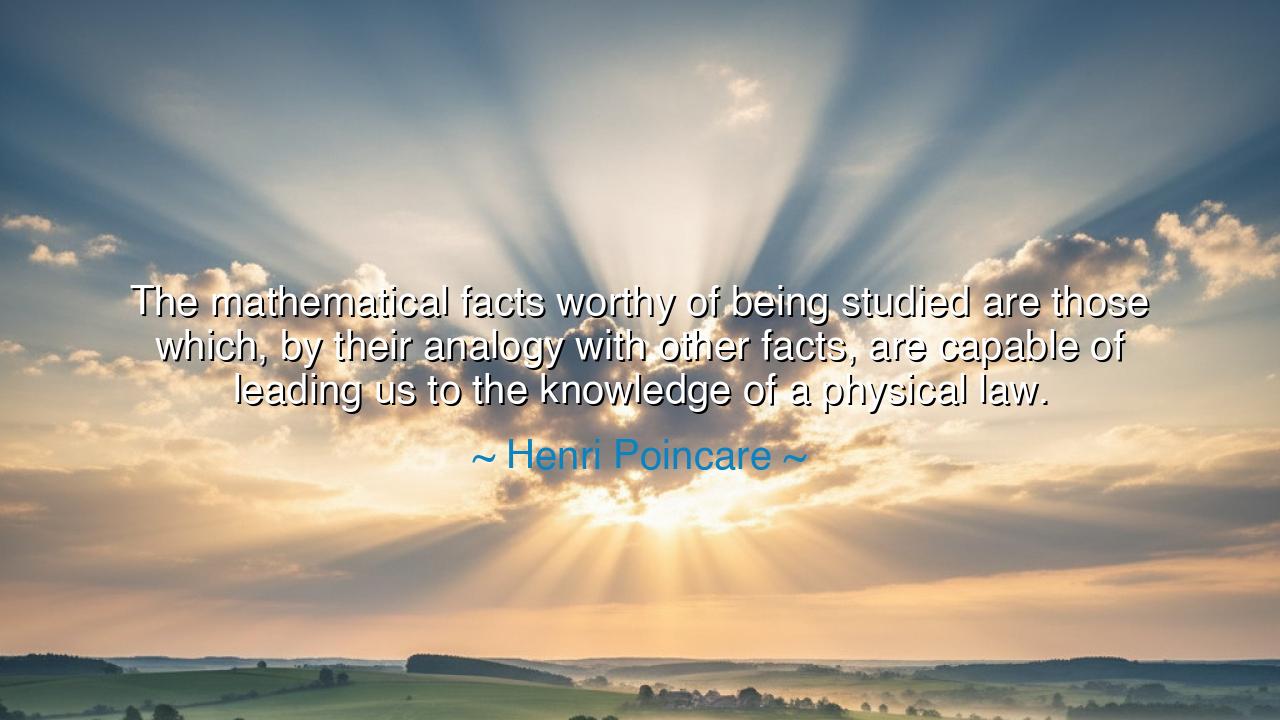
The mathematical facts worthy of being studied are those which
The mathematical facts worthy of being studied are those which, by their analogy with other facts, are capable of leading us to the knowledge of a physical law.






“The mathematical facts worthy of being studied are those which, by their analogy with other facts, are capable of leading us to the knowledge of a physical law.”
Thus spoke Henri Poincaré, one of the great minds of mathematics and physics — a thinker who gazed into the structure of the universe and saw that beauty and truth were bound together. His words are not merely for the mathematician, but for all seekers of wisdom, for they reveal the eternal bond between thought and reality, between the abstract and the tangible, between numbers and nature. In this saying, Poincaré reminds us that mathematics, though born of the mind, is not a game of symbols — it is the language of the cosmos, and through its patterns we catch a glimpse of the laws that govern all existence.
To understand his meaning, one must first know the heart of Poincaré’s philosophy. He lived at a time when mathematics had begun to stretch far beyond the visible, into realms of pure abstraction. Yet he refused to let mathematics drift away from the living world. To him, a mathematical fact was not worthy of study merely because it could be proved — it was worthy because it revealed a harmony with other truths, because through its analogy it could illuminate the hidden principles of the physical universe. For Poincaré, the mathematician was not a mere calculator, but an explorer of creation’s architecture — a bridge between thought and matter.
When he speaks of analogy, he speaks of that sacred resonance that echoes across all branches of knowledge. The circle in geometry mirrors the orbit of a planet; the curve of probability mirrors the motion of crowds; the symmetry of equations mirrors the balance of nature. These parallels are not coincidence — they are the signatures of a unified design, written in different forms across the fabric of reality. The wise mathematician, therefore, studies not isolated problems, but patterns that connect — the deep analogies that whisper of universal law.
History itself bears witness to this truth. Think of Isaac Newton, who sat beneath an apple tree and beheld in that falling fruit the same law that commands the moon. It was not the apple alone that taught him, but the analogy — the realization that the motion of the small mirrors the motion of the great. Through the unity of mathematics, he saw gravity not as a local event but as a cosmic principle. Or recall James Clerk Maxwell, who found in the equations of electricity and magnetism a hidden unity, and through them unveiled the law of light itself. Both men, like Poincaré, sought not scattered facts, but the golden thread that binds them together — the mathematical harmony underlying physical truth.
In Poincaré’s wisdom lies a profound moral teaching as well: seek not knowledge for vanity, but for connection. Facts, by themselves, are like stones scattered in a field — cold, separate, and lifeless. But when placed in relation, when built into arches and bridges, they form meaning. So too with knowledge: it becomes noble only when it leads toward understanding, when it reveals the order behind chaos and draws the human mind closer to the Creator’s design. The study of mathematics, then, is not the study of lifeless symbols, but the search for coherence — the search for that divine rhythm which beats beneath both atom and star.
There is, too, a warning in his words for the modern world: do not let learning become sterile. The age of endless data tempts us to worship quantity over insight. Yet Poincaré teaches that not all facts are worthy of study — only those that lead us toward meaning, that awaken wonder, that connect us to the physical and moral laws that govern life. Knowledge without purpose is noise; but knowledge guided by analogy, by relationship, by harmony, becomes wisdom.
Therefore, O seeker of truth, take this teaching to heart: when you learn, do not seek to amass, but to unify. In every field — be it science, art, or life itself — look for the patterns that bind. Seek the analogy between things; see how the same truth repeats in different forms. The law that governs the stars also governs the soul: both move in harmony when guided by understanding. And when you see this — when you perceive how knowledge mirrors the laws of creation — then, like Poincaré, you will not merely know mathematics or physics, but the wisdom of the universe itself.
For in the end, all knowledge returns to unity. Every equation, every discovery, every law is a doorway to that great realization — that behind all diversity lies a single order, a single purpose, a single truth. Study, then, not to possess knowledge, but to participate in the divine pattern. For that is what Henri Poincaré truly meant: that the facts worthy of our pursuit are those that bring us nearer to the hidden harmony between mind and cosmos, between thought and creation, between the mathematics of man and the laws of God.






AAdministratorAdministrator
Welcome, honored guests. Please leave a comment, we will respond soon